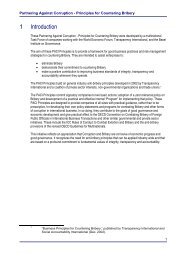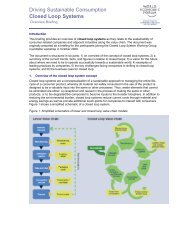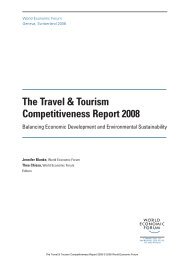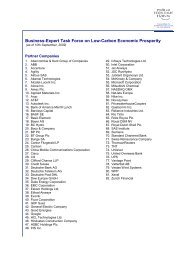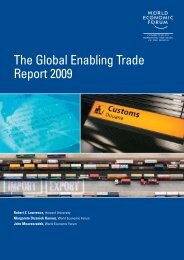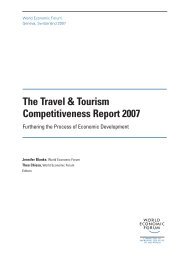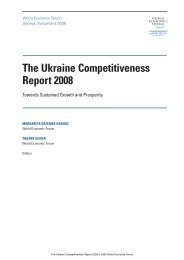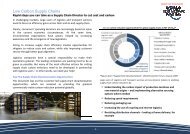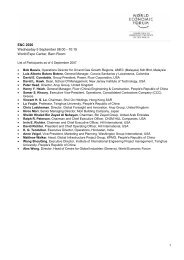Scenarios Come to Davos - World Economic Forum
Scenarios Come to Davos - World Economic Forum
Scenarios Come to Davos - World Economic Forum
You also want an ePaper? Increase the reach of your titles
YUMPU automatically turns print PDFs into web optimized ePapers that Google loves.
<strong>Scenarios</strong> <strong>Come</strong> <strong>to</strong> <strong>Davos</strong><br />
A GBN Conversation with Ged Davis<br />
As one of the masterminds behind the <strong>World</strong> <strong>Economic</strong><br />
<strong>Forum</strong>’s annual <strong>Davos</strong> gathering, this seasoned Shell<br />
scenarist is once again poised <strong>to</strong> help global business<br />
tackle the world’s problems.<br />
Interview conducted by GBN Knowledge Developer Peter Leyden<br />
March 2004
Table of Contents<br />
<strong>Scenarios</strong> <strong>Come</strong> <strong>to</strong> <strong>Davos</strong>..........................................................................................................1<br />
A Systemic Scenarist’s Beginnings ............................................................................................2<br />
The Shell Years and Innovating New Scenario Techniques..........................................................3<br />
To the <strong>World</strong> <strong>Economic</strong> <strong>Forum</strong> and <strong>Davos</strong> .................................................................................5<br />
Bringing <strong>Scenarios</strong> <strong>to</strong> <strong>Davos</strong>......................................................................................................6<br />
The Future of <strong>Scenarios</strong>.............................................................................................................7<br />
Balancing Long-Term and Short-Term Thinking.........................................................................8<br />
Shell’s Current Troubles............................................................................................................9<br />
Business’s Broader Global Responsibilities .............................................................................. 11<br />
Building Exceptional Networks of People................................................................................. 12<br />
The Politics of <strong>Davos</strong> .............................................................................................................. 13<br />
Don’t Dismiss the <strong>World</strong> Social <strong>Forum</strong> .................................................................................... 14<br />
Davis’s Next Focus: China and the Middle East........................................................................ 15<br />
Rising <strong>to</strong> the Challenges of This Century.................................................................................. 16<br />
© 2004 Global Business Network.<br />
This publication is for the exclusive use of Global Business Network members. To request permission <strong>to</strong> reproduce,<br />
s<strong>to</strong>re in a retrieval system, or transmit this document in any form or by any means, electronic, mechanical,<br />
recorded, or otherwise, please contact Global Business Network.<br />
GBN Global Business Network 5900-X Hollis Street Emeryville, California USA 94608 (510) 547-6822 www.gbn.com
<strong>Scenarios</strong> <strong>Come</strong> <strong>to</strong> <strong>Davos</strong><br />
Ged Davis is one of those rare people who has a mastery of both craft and content. His craft is<br />
scenario planning, which he has been practicing nearly since its inception. In 1972, Ged joined<br />
Royal Dutch/Shell, where he worked alongside Pierre Wack, the godfather of scenarios, as well<br />
as GBN’s own Napier Collyns and Peter Schwartz. He later became the head of scenario<br />
planning at Shell, and over the course of his career spearheaded many innovations in the form.<br />
At the same time, he developed deep knowledge about energy, climate change, sustainability,<br />
and global social problems like the spread of HIV/AIDS. In many ways, Ged epi<strong>to</strong>mizes the<br />
wise, socially responsible European business perspective—which is one reason he was<br />
recently chosen <strong>to</strong> head the <strong>World</strong> <strong>Economic</strong> <strong>Forum</strong>’s new Centre for Strategic Insight, the<br />
entity now responsible for setting the agenda for the <strong>Forum</strong>’s prestigious annual gathering in<br />
<strong>Davos</strong>.<br />
In the following interview, Ged reflects on his 30 years at Shell and what he learned in his<br />
various positions in different parts of the company and the world. He does not shy from<br />
commenting on the source of some of Shell’s current troubles. But mostly he talks about<br />
scenarios and the incremental evolution in their use—as well as the understanding of their<br />
limits—over the years. He describes some specific innovations he has made in the form,<br />
particularly in adapting the scenario process for use with large groups of 60 or more people.<br />
And he shares the rule that he uses <strong>to</strong> determine how long a particular set of scenarios will be<br />
useful <strong>to</strong> an organization, which he calls “the rule of seven.”<br />
Ged also shares his vision for the new Centre for Strategic Insight that he heads and for<br />
<strong>Davos</strong>, at which the global business and political elite congregate each year <strong>to</strong> discuss the<br />
state of the world. Not surprisingly, scenarios will be coming <strong>to</strong> <strong>Davos</strong>—as well as <strong>to</strong> the other<br />
regional events for which the <strong>Forum</strong> and Ged’s Centre are responsible. And Ged also talks<br />
about networks—how his Centre recruits and manages the networks of thinkers who form the<br />
heart of <strong>Davos</strong>, and how he hopes <strong>to</strong> form a network of institutes that can develop scenarios,<br />
particularly in regions that are currently not well enough unders<strong>to</strong>od, like India and China.<br />
Ged’s intellectual curiosity and love of learning suffuse this interview. Indeed, he considers<br />
himself on a lifelong quest <strong>to</strong> make sense of the world, and demonstrates a palpable<br />
excitement for the journey. Another theme that Ged says drives his life is the desire <strong>to</strong> make a<br />
difference by identifying problems early and getting groups <strong>to</strong> engage those problems faster<br />
than they might otherwise do on their own. He did that throughout his career as a scenarist in<br />
Shell, and he is poised <strong>to</strong> do it again with his new mission <strong>to</strong> help set the agenda for the<br />
enlightened global business community each year at <strong>Davos</strong>.<br />
GBN Global Business Network • <strong>Scenarios</strong> <strong>Come</strong> <strong>to</strong> <strong>Davos</strong>: A GBN Conversation with Ged Davis 1
A Systemic Scenarist’s Beginnings<br />
GBN: How would you describe yourself and what you do?<br />
Ged Davis: I find it useful <strong>to</strong> start by looking back <strong>to</strong> when I was a kid. I had a reputation as a<br />
daydreamer; I was fascinated by all sorts of ideas. I would say that my real interest is trying <strong>to</strong><br />
make sense of the world. It’s more than that, though. Over the last few decades, I’ve become very<br />
interested in the notion that we can make a difference not just as individuals, but collectively: as<br />
groups, as teams, as communities. I’m absolutely fascinated with trying <strong>to</strong> understand how you can<br />
help large groups make a difference. And making a difference, for me, is about helping people<br />
identify problems and helping them come <strong>to</strong> terms with those problems faster than they otherwise<br />
would.<br />
One of the most important things we can do is <strong>to</strong> define problems clearly. And that got me, from a<br />
fairly early age, thinking about systemic issues. I became fascinated with systems thinking in my<br />
late teens. People who know me say that I tend <strong>to</strong> focus on the big picture. I’m always interested in<br />
the context in which different groups have <strong>to</strong> make decisions. How do we access that context? How<br />
do we ensure that it’s refreshed and new and alive?<br />
I’ve always been a bit uncomfortable with strategic planning. It tends <strong>to</strong> be a very rational and<br />
structured approach. Much more interesting for me is <strong>to</strong> know the strategic context, but this isn’t<br />
easy. You have <strong>to</strong> know it in a way that is somewhat detached from who you are. If you know it<br />
well, you are much better positioned <strong>to</strong> make intelligent decisions. Change the context, and you’ll<br />
change the decisions people make. Change the understanding of the context, and you’ll change the<br />
decisions.<br />
GBN: What are some good ways <strong>to</strong> get <strong>to</strong> know the context?<br />
Davis: One way is <strong>to</strong> try <strong>to</strong> see the world through the eyes of a child. This means that when faced<br />
with a new set of issues, you push back against a very easy de finition of what you’re facing and<br />
open yourself <strong>to</strong> many different perspectives on the problem. Seeing a situation as a child means<br />
for me seeing it without the benefit of our standard disciplines, for example economics and<br />
political science. It’s seeing it without all of the premeditated structures that we have <strong>to</strong> bring <strong>to</strong><br />
bear when we get involved in analysis. Indeed, it is as important <strong>to</strong> get the design of a project and<br />
the perspectives on an issue clear in your mind, as it is <strong>to</strong> do the right analysis.<br />
GBN: How did you go from being a teenager interested in systems theory <strong>to</strong> where you are now?<br />
Could you give a quick timeline of your career?<br />
Davis: As a teenager I was extremely keen on traveling. With that in mind, I started studying<br />
mining engineering, which gave me the opportunity <strong>to</strong> go <strong>to</strong> South Africa in the early 1960s.<br />
Working down in the mines was a real eye-opener, and being in South Africa at the height of<br />
apartheid was quite a shock.<br />
After completing my studies in London, I got an offer <strong>to</strong> go <strong>to</strong> Stanford University. I found<br />
California rather liberating, with many interesting ideas developing. I was very interested in<br />
economics, and soon got an offer <strong>to</strong> go <strong>to</strong> the London School of <strong>Economic</strong>s. So by the mid-‘60s, I<br />
GBN Global Business Network • <strong>Scenarios</strong> <strong>Come</strong> <strong>to</strong> <strong>Davos</strong>: A GBN Conversation with Ged Davis 2
was already working <strong>to</strong> understand the world. I had developed a strong fascination with<br />
international issues, and spent the summer of 1966 in Geneva with the United Nations.<br />
After LSE, I was offered a job at Stanford Industrial Park, and while I was working there got<br />
heavily involved in studying engineering economic systems at Stanford. It was also there that I met<br />
and <strong>to</strong>ok courses from Willis Harmon. In 1969, I remember well a course, which he ran, in which<br />
we looked at the world’s problems as a whole —that was my first real experience in handling global<br />
issues from a holistic perspective, in a way I would later do with scenarios.<br />
By the end of the ‘60s, when I was in my mid- <strong>to</strong> late-20s, all the things that really interested me<br />
one way or another, and that I’ve been doing since, were out there on the table.<br />
The Shell Years and Innovating New Scenario Techniques<br />
GBN: From there you joined Shell?<br />
Davis: I left Stanford in the early ‘70s <strong>to</strong> join Shell, and almost immediately began <strong>to</strong> work on the<br />
very first scenarios that were being developed. Actually, I was working directly for a young man<br />
named Napier Collyns [later a cofounder of GBN]. I was working as an economist, and we were<br />
looking at what might happen if oil prices rose twofold or threefold. I was working on the impacts<br />
on the European economies; this was really fascinating stuff.<br />
I joined Shell in the new enterprises division, and then spent time in the coal business. Much of the<br />
next decade was in business positions—in business development, market development, technology<br />
development, setting up and running a trading company in Asia. So I got quite a good feel for<br />
business. And I had the opportunity <strong>to</strong> travel the world, initially focusing on North and South<br />
America and then living in Australia, spending a lot of time working across Asia.<br />
By the end of the ‘70s, I had gotten <strong>to</strong> know Pierre Wack quite well. He asked me <strong>to</strong> go back <strong>to</strong><br />
London and join his team as head of energy scenario development, and it was then that I got<br />
absolutely and <strong>to</strong>tally involved in scenario work. The main emphasis of the work was on energy<br />
and oil issues, economics and geopolitics, but that was just part of the s<strong>to</strong>ry. By the early ‘80s,<br />
we’d started <strong>to</strong> look at the importance of societal and broader technological issues.<br />
Working with Pierre was a richly rewarding experience. I was involved in hard-headed issues of<br />
business, yet at the same time there was a fair degree of freedom <strong>to</strong> think about the world in the<br />
broader sense. I thought this was an absolute dream situation. It was hard work, but that was<br />
probably a measure of the fact that people were passionately interested in what was going on.<br />
Our work was about real issues facing Shell’s businesses; we believed that we were genuinely<br />
helping people make a difference. What you said had <strong>to</strong> be useful and it also had <strong>to</strong> be very<br />
honest—there is no point in fooling yourself about your understanding of the world. So along with<br />
intellectual integrity you needed relevance. Working in a company, you’re forced <strong>to</strong> be relevant,<br />
but it’s not always easy <strong>to</strong> put the two things <strong>to</strong>gether.<br />
GBN: You spent 30 years in Shell. What did you do in your later years there?<br />
GBN Global Business Network • <strong>Scenarios</strong> <strong>Come</strong> <strong>to</strong> <strong>Davos</strong>: A GBN Conversation with Ged Davis 3
Davis: In 1986, having previously been head of Shell’s planning in Europe, I was invited by Peter<br />
Schwartz, who was then in charge of the Shell scenarios team, <strong>to</strong> head the energy side of the<br />
activities. I headed the global energy team for four years. That was, for me, a rather fruitful period.<br />
I led a number of scenario projects and really started <strong>to</strong> get my head around issues like climate<br />
change and sustainable development, long before they really became central <strong>to</strong> the business<br />
agenda.<br />
I then spent four years heading Shell’s inves<strong>to</strong>r relations activities, dealing with Wall Street and<br />
with inves<strong>to</strong>rs. When you work closely with Wall Street, it opens your eyes <strong>to</strong> the reality of how<br />
the market operates. I actually enjoyed working with the analysts and needing <strong>to</strong> explain very<br />
complex situations simply and clearly. But immediately you can see the problems and the potential<br />
for spin in situations like that.<br />
I came back in<strong>to</strong> the scenario team in 1994, looking after geopolitics, technology, and society. And<br />
then I headed a new unit working on new scenario processes and applications. I had started <strong>to</strong><br />
develop something different from what Shell was doing—namely, techniques that would allow<br />
groups of 60 or so people <strong>to</strong> develop scenarios. I tried these methods out with a project for the<br />
<strong>World</strong> Business Council for Sustainable Development on the future of sustainable development,<br />
which turned out <strong>to</strong> be a surprisingly successful project. The scenarios had considerable impact,<br />
largely, I think, because the techniques we developed almost forced ownership. So I got very much<br />
involved with the question of how you build scenarios that are owned by larger groups of people<br />
with a capacity <strong>to</strong> act. For me, that was an important step in my own thinking.<br />
GBN: When you say “new techniques,” are you talking about new ways <strong>to</strong> facilitate groups, or<br />
new approaches <strong>to</strong> creating scenarios?<br />
Davis: The techniques we developed were for working with quite largish teams. Before I got in<strong>to</strong><br />
this project, my general view was that I really didn’t want <strong>to</strong> work with more than 20 people.<br />
Working with groups of 50 <strong>to</strong> 60 people <strong>to</strong> build scenarios is quite problematic. But because there<br />
was such a demand, we actually worked with that number.<br />
Just before I left Shell, I produced a booklet called “An Explorer’s Guide <strong>to</strong> Scenario<br />
Development.” It actually outlines the processes we’ve used. These are long-duration processes<br />
that last nine months <strong>to</strong> a year and involve a minimum of three workshops. The first one defines the<br />
problematique (which is a fancy word for something that’s slightly grander than just a problem).<br />
The second one is building the scenarios; and the third one is affirming the scenarios. The<br />
workshops themselves run three <strong>to</strong> five days, so they’re quite full.<br />
GBN: What do you mean by “affirming the scenarios”?<br />
Davis: Initially, we select and work with a group of people, ideally stakeholders of the problem, <strong>to</strong><br />
define the problematique. We bring a lot of material and many different perspectives <strong>to</strong>gether.<br />
Next, we lay out the basics for a research program. Then we do the research, and then we come<br />
back <strong>to</strong> build the scenarios in a four- or five-day workshop.<br />
The scenarios are built by the 50 <strong>to</strong> 60 people in the workshop, and we facilitate that. Then we take<br />
those scenarios away, develop them in detail, and bring them back for what we call an<br />
“affirmation” workshop. We seek their endorsement and ownership of the detailed scenarios that<br />
were developed. Normally, that’s a very <strong>to</strong>ugh meeting.<br />
GBN Global Business Network • <strong>Scenarios</strong> <strong>Come</strong> <strong>to</strong> <strong>Davos</strong>: A GBN Conversation with Ged Davis 4
To the <strong>World</strong> <strong>Economic</strong> <strong>Forum</strong> and <strong>Davos</strong><br />
GBN: When did you retire from Shell and move on <strong>to</strong> your current position?<br />
Davis: I retired from Shell in the middle of last year. I’d been working on the UN AIDS project<br />
(the future of HIV/AIDS in Africa) for a year and transitioned out of Shell as direc<strong>to</strong>r of this<br />
project. I was also doing some work on the redesign of a new strategy for the <strong>World</strong> <strong>Economic</strong><br />
<strong>Forum</strong>, and through that got involved in the design of what’s now called the Centre for Strategic<br />
Insight. I was offered the opportunity <strong>to</strong> head that new entity at the end of last year. We formally<br />
launched the Centre in March 2004.<br />
GBN: Could you say more about how that opportunity came about?<br />
Davis: I had contact with the <strong>World</strong> <strong>Economic</strong> <strong>Forum</strong> before I left Shell. I was involved in their<br />
discussions on the new direction the organization might want <strong>to</strong> take, and I found them an<br />
interesting group of people with very broad interests. They are probably best known for <strong>Davos</strong>, but<br />
the <strong>World</strong> <strong>Economic</strong> <strong>Forum</strong> is much more than that, with many different initiatives. It has a very<br />
interesting philosophy that is closely aligned with my own, which is that they want <strong>to</strong> ensure that<br />
the world community identifies and moves forward on relevant issues and problem areas as quickly<br />
as possible.<br />
My interest is really in what set of <strong>to</strong>ols and what sort of approaches and processes we can bring <strong>to</strong><br />
bear <strong>to</strong> allow us <strong>to</strong> address these concerns more quickly, more successfully, and more effectively.<br />
The Centre is anticipa<strong>to</strong>ry in nature. It’s dedicated <strong>to</strong> trying <strong>to</strong> understand the new agendas of<br />
government and business, with an eye <strong>to</strong> the next two years. This allows me <strong>to</strong> bring in many of the<br />
<strong>to</strong>ols that I’ve been working with and ways of thinking I’ve used and seen used by others in<strong>to</strong> the<br />
Centre. And it’s designed <strong>to</strong> do that.<br />
We have a small scenario team and will develop industry strategy processes. We’ve got a capacity<br />
<strong>to</strong> design interventions—workshops, roundtables, scenario projects, vision projects—within the<br />
<strong>Forum</strong>. That’s the capacity we’re building.<br />
GBN: How does the Centre for Strategic Insight relate <strong>to</strong> <strong>Davos</strong>?<br />
Davis: The Centre is responsible for the content of <strong>Davos</strong> and for designing the regional summits.<br />
<strong>Davos</strong> is designed not as a conference but as an overlapping set of meetings <strong>to</strong> further the global<br />
agenda. It’s quite difficult <strong>to</strong> get one’s head around <strong>Davos</strong>. It’s 225 main sessions and 800 private<br />
sessions; it’s got quite a complex architecture. The Centre for Strategic Insight is responsible for<br />
that design. It has inherited what was the global agenda team in the <strong>Forum</strong> and the team that does<br />
the global competitiveness work.<br />
GBN: Does your group design the “meta” theme of <strong>Davos</strong>?<br />
Davis: Not only the themes, but also the formats, the people, the way the questions are framed, and<br />
so on. We’re involved in the regional work as well. In fact, we’re developing some new ways of<br />
doing regional work, because issues at a regional level both contribute <strong>to</strong> and are a reflection of<br />
global issues.<br />
GBN Global Business Network • <strong>Scenarios</strong> <strong>Come</strong> <strong>to</strong> <strong>Davos</strong>: A GBN Conversation with Ged Davis 5
GBN: How big is the Centre?<br />
Davis: Not large—25 <strong>to</strong> 30 people. The whole of the <strong>Forum</strong> is not particularly large; it’s in the<br />
order of 160 people, and it’s based in Geneva.<br />
Bringing <strong>Scenarios</strong> <strong>to</strong> <strong>Davos</strong><br />
GBN: Is it safe <strong>to</strong> say that <strong>Davos</strong> will be doing more with scenarios?<br />
Davis: At the moment, we’re just beginning <strong>to</strong> initiate our own scenario work, and we have only a<br />
small capacity within the <strong>Forum</strong>. But I’m looking <strong>to</strong> work with different groups around the world.<br />
We intend <strong>to</strong> do much more regional work, in particular from an Indian perspective or a Chinese<br />
perspective or an African perspective, rather than just a European or North American perspective;<br />
we tend <strong>to</strong> get embedded in our own perspectives. I’m interested in putting <strong>to</strong>gether a network of<br />
institutes that will assist in our regional work and participate in the development of global<br />
scenarios. We’ll probably kick off with work on the future of India.<br />
GBN: And how would that get drawn back in<strong>to</strong> <strong>Davos</strong>?<br />
Davis: The platforms for both presenting and examining the implications of the scenarios could be<br />
either the regional summits or <strong>Davos</strong>. In fact, there was some scenario work in <strong>Davos</strong> last year; I<br />
was in a number of sessions in which scenarios were <strong>to</strong>uched upon. But my aim is <strong>to</strong> bring the<br />
skills and knowledge that I’ve developed in my career <strong>to</strong> the broad service of the <strong>Forum</strong> and its<br />
members.<br />
GBN: Earlier, you said that the Centre is trying <strong>to</strong> understand the new agendas of government and<br />
business specifically over the next two years. Usually scenarios consider a much longer timeframe.<br />
Davis: That’s an important point. The time horizons for much of the work around investment in<br />
energy are at least 20 years. But when we did the work on sustainable development, we were doing<br />
50-year scenarios. For climate change, it was 100-year scenarios. For IT companies, five years is a<br />
long time. The industry you’re in and the nature of the issue and decisions you face determine, <strong>to</strong> a<br />
large extent, relevant time horizons. At the Centre, we will do scenarios with long time horizons. It<br />
may be 10-year work; it may even be 50-year work.<br />
So why the focus on two years? It comes back <strong>to</strong> a personal view, which is that whenever we do<br />
work for 20 years, it’s not about forecasting 20 years ahead—it’s about using what we learn about<br />
what might happen in the coming 20 years <strong>to</strong> shape policy in the next one or two years.<br />
Normally, when you finish scenario work, you have a very short window in terms of application. I<br />
have a personal rule, something I’m quite prepared <strong>to</strong> share with people —it’s called “the rule of<br />
seven.” If you take the time horizon of a piece of work and divide by seven, that probably gives<br />
you some idea of how long these scenarios will remain credible and be used. In Shell, for example,<br />
20-year scenarios are renewed every three years; nobody is terribly interested in the 20-year<br />
scenarios you did three years ago. So it’s not a hard and fast rule, but the important point is that<br />
GBN Global Business Network • <strong>Scenarios</strong> <strong>Come</strong> <strong>to</strong> <strong>Davos</strong>: A GBN Conversation with Ged Davis 6
we’re not talking about scenarios being used for the full time horizon, but about a seventh of the<br />
time horizon. Their value, over time, diminishes very quickly. They become his<strong>to</strong>rical relics.<br />
In scenario work, you’re continually asking yourself two quite different things: (1) how will the<br />
world develop over a fairly lengthy period and (2) how can I use the results of that work in the<br />
coming one or two years. I’m interested in how you take any study of the future and bring it back<br />
in a way that can be used <strong>to</strong> make decisions in the short term.<br />
GBN: So the two-year timeframe for the <strong>Davos</strong> forums will be informed by longer-term thinking.<br />
Davis: It will be informed by any relevant piece of work. If we’re talking about scenarios, it could<br />
be informed by scenarios that are 10, 20, 40 years ahead. I was not involved in the design of <strong>Davos</strong><br />
this year. But Peter Schwartz, for example, had a series of sessions about the world in 2014; just <strong>to</strong><br />
push people’s thinking.<br />
So what’s the relevance of that <strong>to</strong> decision-makers? Well, they might take away some new ideas.<br />
And they will ask themselves, if they’re really interested, “How can I use that <strong>to</strong> sharpen my<br />
decision-making or policy-making, and do I have the right things on the agenda or not?”<br />
The Future of <strong>Scenarios</strong><br />
GBN: You’ve been involved with scenarios really since their inception. Are scenarios becoming a<br />
mainstream business <strong>to</strong>ol, or are they still received as a very new way of thinking?<br />
Davis: Well, let me just roll out my hobby horse here. First, I get quite angry sometimes when<br />
people say they want <strong>to</strong> do scenarios. Frankly, I’m not interested in doing scenarios. I’m interested<br />
in understanding some of the critical uncertainties we face as organizations and figuring out how <strong>to</strong><br />
better position ourselves. And I can’t always tell if scenarios are the right <strong>to</strong>ol for that until I start<br />
studying the problem.<br />
Second, you can learn scenario processes within a day; at GBN, you do a very good course within a<br />
week. Many people go off and do scenarios based on that, which I think is fine. But if you’re<br />
dealing with really complex issues, you have <strong>to</strong> approach them with the eye of an architect or a<br />
designer. You have <strong>to</strong> say, “Look, we’ve got a whole range of ways of getting people <strong>to</strong> interact.<br />
We’ve got many different formats we can use. We’ve got <strong>to</strong> be meticulous in our selection of the<br />
people who should be involved in shaping and making scenarios.” <strong>Scenarios</strong> are an important<br />
<strong>to</strong>ol—a fundamentally useful intervention—when we’re dealing with problems where there is a<br />
lack of clarity around the problem area and fundamental uncertainty in outcomes. But I think the<br />
<strong>to</strong>ols themselves are not always easy <strong>to</strong> use successfully. There is a long list of organizations that<br />
have tried scenarios and said, “This doesn’t work for us.”<br />
GBN: Why is that?<br />
Davis: One of the reasons is that the people don’t invest in it. They expect quick results. You have<br />
<strong>to</strong> be a brave organization <strong>to</strong> spend significant money, maybe in excess of a million dollars, <strong>to</strong> get<br />
in<strong>to</strong> a project without knowing clearly how <strong>to</strong> use the results. And many of those who have reached<br />
GBN Global Business Network • <strong>Scenarios</strong> <strong>Come</strong> <strong>to</strong> <strong>Davos</strong>: A GBN Conversation with Ged Davis 7
<strong>to</strong>p management positions have been successful in managing operations and have been less<br />
interested in strategic context.<br />
I personally believe scenarios, or certainly scenaric thinking, can help us <strong>to</strong> think clearly about the<br />
problems and the risks we face. And I would argue that assessing risks and being attentive <strong>to</strong> the<br />
right risks is a fundamental responsibility of anybody in a leadership position. In general, the <strong>to</strong>ols<br />
that have been developed across the set of practitioners who do scenarios can aid many people. But<br />
they’re not everybody’s cup of tea.<br />
GBN: Are you confident that other <strong>to</strong>ols for systematically understanding future options will be<br />
innovated in the next 10 years that will either complement scenarios or succeed scenarios?<br />
Davis: I think scenario practitioners are very conscious of the need <strong>to</strong> have a wide suite of <strong>to</strong>ols.<br />
Both those that allow them <strong>to</strong> develop useful scenarios quickly and also <strong>to</strong>ols and processes that<br />
push the frontiers on larger and more complex long-term projects. These can last a year or more,<br />
especially if they involve multi-stakeholder groups.<br />
The projects that most interest me are ones that involve working with a set of leaders in an area,<br />
who sometimes don’t know each other well, and using scenario development as a medium for them<br />
<strong>to</strong> better understand the bigger picture. Done well, this can lead <strong>to</strong> identification of new policy<br />
issues they should consider and better understanding of the risks they face, and can lead <strong>to</strong> new<br />
ways of collaborating. And that is something I would like <strong>to</strong> do more of in the <strong>Forum</strong>.<br />
Balancing Long-Term and Short-Term Thinking<br />
GBN: From 1990 <strong>to</strong> 1994, you were head of Royal Dutch/Shell’s inves<strong>to</strong>r relations activities<br />
worldwide. That made you the point person for dealing with s<strong>to</strong>ck market analysts in the United<br />
States. What are your thoughts about the pressure of the market <strong>to</strong> focus on the short term over the<br />
long term?<br />
Davis: I was always struck by analysts’ arguments that they do look longer term. However, their<br />
notion of the longer term is somewhat shorter than mine. Their argument is that if you really want<br />
<strong>to</strong> assess a company, you’ve got <strong>to</strong> understand the quality and integrity of its management and the<br />
quality of its investments and its assets. You need <strong>to</strong> be convinced that over the longer haul, it’s<br />
going <strong>to</strong> deliver the income levels it promises. Thus the need <strong>to</strong> think through the longer term. But,<br />
of course, information about a company is being revealed all the time. Thus present events will<br />
change views of longer term developments and will from time <strong>to</strong> time significantly impact<br />
valuation of the company and share prices.<br />
When I discussed the longer-term scenario work I did at Shell with investment analysts, my aim<br />
was <strong>to</strong> help them better understand the strategic context of Shell’s investment program. This gave<br />
them a better understanding of where Shell’s future and the source of its future income lay and the<br />
attendant risks. However, there is a limit <strong>to</strong> their interest in the longer term because it’s the nature<br />
of financial analysis <strong>to</strong> discount the future and be interested in present value. So they have less<br />
interest in the future than someone interested in global systemic issues, which may only be<br />
resolved over decades.<br />
GBN Global Business Network • <strong>Scenarios</strong> <strong>Come</strong> <strong>to</strong> <strong>Davos</strong>: A GBN Conversation with Ged Davis 8
I was talking <strong>to</strong> a fund manager once about work out <strong>to</strong> 2050. He said, “Look, in my business, if<br />
you want <strong>to</strong> talk about 2050, come <strong>to</strong> me with your money in 2049 and I’ll tell you how <strong>to</strong> invest<br />
it.” In managing liquid assets you will be interested in short-term profitability, portfolio resilience,<br />
timing issues, exit strategies, and so on.<br />
If you’re in other lines of business, in many cases you’re dealing with assets that, once they’re<br />
placed, can’t be moved—it’s a refinery in Japan, or it’s a lubricants plant somewhere in India, or<br />
it’s an offshore rig. One of the reasons Shell has been most active in the use of scenarios is that you<br />
can’t avoid the fact that there are fundamental political, economic, regula<strong>to</strong>ry, and environmental<br />
risks <strong>to</strong> virtually every sec<strong>to</strong>r of your business. And you better make sure you understand them<br />
before you invest. That’s what prudence would tell you. Some industries naturally have long-term<br />
horizons for investment; the energy business is one of them. Others are very short. So I’m less<br />
critical of the focus by some analysts on the short term than others, perhaps.<br />
GBN: But the problematiques that you’re talking about are clearly long-term problems that require<br />
long-term solutions.<br />
Davis: They’re both short and long term. A good example: Take the work on the future of energy<br />
and the potential importance of renewables, looking out <strong>to</strong> 2050. We need <strong>to</strong> do that work out <strong>to</strong><br />
2050 because only then can we begin <strong>to</strong> understand what a fully fledged, mature renewables<br />
industry would look like. It helps us <strong>to</strong> tease out many of the problems we’re likely <strong>to</strong> face going<br />
forward. But you have <strong>to</strong> bring that right back down <strong>to</strong> the decision of whether you’re going <strong>to</strong><br />
invest in a solar pho<strong>to</strong>-voltaic plant or whether you’re going <strong>to</strong> invest in a series of wind turbines<br />
up and down the coast, and then you’re dealing with short-term issues. What are the current<br />
regulations? What are the risks around investment in terms of local public attitudes <strong>to</strong>ward large<br />
numbers of wind turbines? And so on.<br />
For me, one is always looking at two different sets of scenarios <strong>to</strong> address a particular subject area.<br />
The long term provides context and understanding for thinking about the big investments you<br />
make, and then you make those investments in the short term. The context for short-term planning<br />
is not the same as that for assessing longer-term developments. That’s one of the reasons we were<br />
involved in many different types of scenario projects at Shell, because you don’t solve the risk<br />
issues in a subject area just by doing one set of scenarios.<br />
Shell’s Current Troubles<br />
GBN: What is your take on Shell’s current problems?<br />
Davis: Well, I should emphasize that I’m outside of Shell, so these are just personal reflections.<br />
But I think I can list some of the contributing fac<strong>to</strong>rs. The first one is that if you do not have good<br />
communication with the market, you necessarily will have problems at some point. I think Shell’s<br />
communication with the market has not been as good as it should have been. Secondly, you have <strong>to</strong><br />
be able <strong>to</strong> communicate complex issues very simply and with a high level of integrity—and you<br />
have <strong>to</strong> be believed. When you’re dealing with important financial issues you’ve got <strong>to</strong> religiously<br />
adhere <strong>to</strong> the guidelines that are set by the SEC, if that’s the relevant exchange commission you’re<br />
GBN Global Business Network • <strong>Scenarios</strong> <strong>Come</strong> <strong>to</strong> <strong>Davos</strong>: A GBN Conversation with Ged Davis 9
dealing with, and you need audi<strong>to</strong>rs <strong>to</strong> assist you in ensuring a high level of integrity. My own<br />
experience working in the finance area has been that Shell and its audi<strong>to</strong>rs had been exceptionally<br />
diligent at that in the early 1990s. Thus I am shocked by recent events.<br />
But what appears <strong>to</strong> have been the case is that, in this particularly difficult area of assessing how<br />
reserves should be classified under the SEC guidelines, Shell has taken a very liberal interpretation<br />
of proven reserves and moved beyond the guidelines. The issue is not that the oil isn’t in the<br />
ground—the issue is the appropriate classification for the oil in the ground. We have <strong>to</strong> wait and<br />
see what all of the investigations indicate, but the fact that Shell <strong>to</strong>ok the initiative itself <strong>to</strong><br />
reclassify the reserves indicates that, on reflection, it was not happy with the way that work was<br />
done locally.<br />
Now if you’re in a situation where you’ve got a complex and difficult issue <strong>to</strong> explain and you’re<br />
not communicating very well, it’s quite possible you’re not going <strong>to</strong> be heard. And if you’re not<br />
heard and people don’t understand what’s going on, it’s not unreasonable that some of them are<br />
going <strong>to</strong> fear the worst. I think some people are pretty unhappy.<br />
And then we have the issue of Shell’s governance. It does appear that the greater control given <strong>to</strong><br />
Shell’s businesses post the 1995 reorganization and the weaker central finance control has been a<br />
contributing fac<strong>to</strong>r.<br />
As a shareholder in Shell, I am not very happy. As somebody whose career has been at Shell, I’m<br />
also not very happy. But we’ll have <strong>to</strong> wait and see what the outcome is. We don’t have all the<br />
information, but it does appear that personal misjudgment at the highest level also played a part. I<br />
think there will be a deep and searching review and I would hope it is made public.<br />
GBN: Many people associate Shell with long-term, sustainable thinking. Do Shell’s recent<br />
problems threaten that? Will some now associate Shell with making tradeoffs and focusing on<br />
shareholder return?<br />
Davis: Well, some people may draw that conclusion. But this is not new—in 1998, when the<br />
company had real difficulties with $10 oil, the view some people had then was that Shell was<br />
spending <strong>to</strong>o much of its time worrying about sustainable development. The position Shell<br />
management <strong>to</strong>ok—and I believe it was right—was that there is no point in having progressive<br />
values unless one is financially strong enough <strong>to</strong> be able <strong>to</strong> implement them. Thus was conceived<br />
the notion of “profit and principle.” It’s the old s<strong>to</strong>ry about walking and chewing gum at the same<br />
time: you’ve got <strong>to</strong> be able <strong>to</strong> be profitable <strong>to</strong> survive, but be you must be profitable and be honest<br />
<strong>to</strong> your principles. If you lose your principles, you have <strong>to</strong> ask yourself why you are making<br />
profits.<br />
I strongly believe that Shell is a principled company. We set out <strong>to</strong> earn a decent income because<br />
that’s the only way we can pay our people and can honor the responsibility <strong>to</strong> our shareholders.<br />
Many of Shell’s shareholders are long-term holders in Shell shares. There’s no doubt that recent<br />
events have damaged Shell’s reputation for high integrity, and it’s going <strong>to</strong> be hard work <strong>to</strong> get it<br />
back again. Those people who want <strong>to</strong> see Shell succeed have got a <strong>to</strong>ugh job ahead of them, but I<br />
think we have <strong>to</strong> put it in context. We’re talking about the classification of reserves, organizational<br />
weaknesses, and personal misjudgments—we’re not talking about more than that at the moment.<br />
But we’ll have <strong>to</strong> see what happens. It could be that more damage is done <strong>to</strong> Shell’s reputation<br />
when we know the full details.<br />
GBN Global Business Network • <strong>Scenarios</strong> <strong>Come</strong> <strong>to</strong> <strong>Davos</strong>: A GBN Conversation with Ged Davis 10
Business’s Broader Global Responsibilities<br />
GBN: The <strong>World</strong> <strong>Economic</strong> <strong>Forum</strong> seems <strong>to</strong> be embracing the long-term approach. Is this an<br />
encouraging sign of a broader sea change in attitudes coming <strong>to</strong> all business?<br />
Davis: The central problem we face—and I can see it at the <strong>World</strong> <strong>Economic</strong> <strong>Forum</strong>—is how we<br />
can enact our vision, that is, the hopes we have for making the world a better place, and yet ensure<br />
the shorter-term livelihood of the organization. It’s a classic problem. We have it as individuals; we<br />
have it as companies; we have it as governments. It comes down <strong>to</strong> how much time and effort you<br />
are prepared <strong>to</strong> invest in ensuring a better world for your children and your grandchildren.<br />
We have <strong>to</strong> get that balance right. The real battle—the really interesting divide—is between those<br />
who think short term and those who think long term. In my view, that is part of the discussion<br />
about the role of capitalism and its capacity <strong>to</strong> handle the longer-term problems that we face.<br />
Capitalism is not necessarily always the best set of ideas for doing that. On the other hand, it offers<br />
us efficiency, and efficiency is <strong>to</strong> be lauded. If we’re more efficient, we then have more resources<br />
<strong>to</strong> do other things.<br />
GBN: Do you think business needs <strong>to</strong> get more involved in finding ways <strong>to</strong> feed the world—in<br />
other words, the long-term issue of international development?<br />
Davis: My interests in international development go back <strong>to</strong> the 1960s, and I still maintain a direct<br />
interest through my position on the board of the International Development Research Center. I<br />
don’t see how business, particularly if it intends <strong>to</strong> play an important role in poorer countries, can<br />
do anything other than take on broader responsibilities.<br />
GBN: Do you think this is a widespread belief in business circles?<br />
Davis: I don’t know. But it’s certainly been a trend for 30 years, and there’s no current indication<br />
that it’s reversing. We live in a period where there are some extraordinarily philanthropic<br />
individuals, of which the star is probably Bill Gates. A large amount of philanthropic money has<br />
come from business—just look at the larger foundations. Equally, more of the new business<br />
opportunities lie in some of the poorer parts of the world. I believe the legitimacy of business is<br />
compromised unless it acts as a good local citizen, and this implies an increased concern with<br />
development issues.<br />
I think a lot depends on your fundamental stance on life. I’m a positive person. I think there’s<br />
nothing more fascinating <strong>to</strong> understand than the big issues we face, and nothing more important <strong>to</strong><br />
do than <strong>to</strong> begin <strong>to</strong> make a dent in<strong>to</strong> them. And the quicker we address these problems the better,<br />
with goodwill and hopefully with adequate resources. One of the great contributions that business<br />
has made is <strong>to</strong> free up resources. There’s no question we spend a lot of resources on some highly<br />
questionable things, but no, I’m not a complete skeptic about business.<br />
GBN: And the trend line is in this direction?<br />
Davis: Well, one has <strong>to</strong> be careful about trend lines, if you’re in the scenario business. There are<br />
certainly plausible scenarios in which a concept like sustainable development is brought in<strong>to</strong> the<br />
mainstream. The work we and others did in ‘96, ’97, laying out possible futures for sustainable<br />
GBN Global Business Network • <strong>Scenarios</strong> <strong>Come</strong> <strong>to</strong> <strong>Davos</strong>: A GBN Conversation with Ged Davis 11
development, highlighted new forms of social reporting, new alliances between NGOs and<br />
business and more—all of that has occurred much more quickly than we might have expected,<br />
though not always successfully.<br />
I think we need <strong>to</strong> be careful about drawing hard edges around businesses and NGOs and other<br />
groups, especially when we are dealing with problem areas where we all have a role <strong>to</strong> play. What I<br />
find most exciting is working with people who have different backgrounds on a problem of joint<br />
interest and finding solutions that we would not have found on our own. If you are trying <strong>to</strong> solve<br />
difficult problems, I don’t care whether you’re from Company A, NGO B, Government C, or that<br />
you’re just Ms. D—as long as you want <strong>to</strong> make a contribution, let’s see what we can do <strong>to</strong>gether<br />
<strong>to</strong> find solutions. That is the healthiest way <strong>to</strong> approach things.<br />
Building Exceptional Networks of People<br />
GBN: GBN tries <strong>to</strong> build out a network of people with diverse viewpoints and different<br />
perspectives. To what extent is that something you’re doing now with the <strong>Forum</strong>?<br />
Davis: I really think your external relations and networks are a measure of who you are. The great<br />
strength of the Shell scenario team, which was always very small, was the network of people we<br />
developed from the early 1970s. It’s an absolutely exceptional network. So when you have a<br />
problem—you want <strong>to</strong> look at, say, the future of Thailand, or you’re concerned about some new<br />
business area—you could always put <strong>to</strong>gether a challenging and insightful group.<br />
What intrigues me about the <strong>World</strong> <strong>Economic</strong> <strong>Forum</strong> is that it has probably the most exceptional<br />
network in the world that I have come across. It has close <strong>to</strong> a thousand companies. There are some<br />
1,500 identified people just in our faculty networks. We are also connected <strong>to</strong> the community of<br />
religious leaders in the world; the community of NGOs; the community of labor leaders. The<br />
<strong>Forum</strong> creates communities—the new young-leaders communities, tech pioneers, and so on. The<br />
understanding you have of the world really comes out of your interaction with these communities<br />
and networks. Ideally, in some areas, you’d like <strong>to</strong> evolve from having a network, which is people<br />
who are at a distance you can communicate with, in<strong>to</strong> genuine communities of interest and<br />
purpose, where people are actually participating and creating new initiatives.<br />
Across the <strong>World</strong> <strong>Economic</strong> <strong>Forum</strong>, we see all sorts of organizations or structures, from networks<br />
right through <strong>to</strong> strong communities. Ideally, the individual business groups are organized around<br />
communities. I think organizations that are well situated at the center of extensive networks, and<br />
that have a capacity <strong>to</strong> create new communities, are much better positioned <strong>to</strong> understand what’s<br />
going on in the world. And life is much more interesting when you are lucky enough <strong>to</strong> be at the<br />
hub.<br />
GBN: Do you systematically pull these communities <strong>to</strong>gether? For example, the young leaders?<br />
Davis: A lot depends on the self-organizing capacity of the groups. Certainly, young leaders tend<br />
<strong>to</strong> have a lot of energy and a lot of vision, and they value enormously the possibility of interacting<br />
with other young leaders who they otherwise wouldn’t know. And some are very active. We have<br />
groups in the Arab world, in the Asian world, and so on. Helping people find each other, with a<br />
GBN Global Business Network • <strong>Scenarios</strong> <strong>Come</strong> <strong>to</strong> <strong>Davos</strong>: A GBN Conversation with Ged Davis 12
positive vision of possibilities in the broadest sense, is a valuable thing. But it’s not new. Many<br />
other organizations have aspired <strong>to</strong> that, and some have been very successful.<br />
GBN: Do you have an approach or system for identifying new people in the network?<br />
Davis: We have a structured scouting process. For example, for <strong>Davos</strong> 2005, we will send people<br />
on scouting missions. Our scouts tend <strong>to</strong> have subject areas. They’re managing as many as 50 or 60<br />
people on their own networks, and they have a responsibility <strong>to</strong> find new people. But there are lots<br />
of ways <strong>to</strong> do it. You can talk <strong>to</strong> people you trust. You can do searches, read books, go <strong>to</strong><br />
conferences.<br />
The early part of the activity for designing a new <strong>Davos</strong> is <strong>to</strong> do scouting <strong>to</strong> identify new people.<br />
And, obviously, we do a lot of work <strong>to</strong> try <strong>to</strong> understand what the new problematique is, because<br />
it’s around that that we build sessions and invite people.<br />
GBN: To make it clear, you’re saying that part of the scouting is <strong>to</strong> uncover the new problem?<br />
Davis: At one level, we’re scouting <strong>to</strong> look for new people. But new people come with new<br />
perceptions and new ideas. So, in parallel, we begin <strong>to</strong> think through the design of the next <strong>Davos</strong>.<br />
It’s a process not that different from building scenarios. You need <strong>to</strong> understand the main themes<br />
and issues that you’re dealing with, and then you have <strong>to</strong> decide how they’re going <strong>to</strong> be handled in<br />
a four- or five-day meeting.<br />
The Politics of <strong>Davos</strong><br />
GBN: How would you place the <strong>World</strong> <strong>Economic</strong> <strong>Forum</strong> in terms of global politics? What is its<br />
political role or political view, if any?<br />
Davis: The <strong>World</strong> <strong>Economic</strong> <strong>Forum</strong> is at pains <strong>to</strong> point out that it’s not a political organization and<br />
it does not represent any companies. Our interest is really bringing <strong>to</strong>gether relevant parties <strong>to</strong> push<br />
debate forward. So one of the most heavily represented groups in the last two years has been<br />
people from the U.S. government. We had Dick Cheney; last year we had Colin Powell; we had a<br />
significant number of people from the Bush cabinet. We had also [Iranian president Mohammed]<br />
Khatami. We had [Pakistani president Pervez] Musharraf. So our prime interest is really <strong>to</strong> bring<br />
<strong>to</strong>gether people who are involved in shaping events.<br />
At <strong>Davos</strong> you can get [British Foreign Secretary] Jack Straw <strong>to</strong>gether with Khatami <strong>to</strong> talk about<br />
civil nuclear issues or even military nuclear issues. We’re not really here pushing one view. That<br />
said, not everybody you invite will come, for all sorts of reasons. Therefore what you see at <strong>Davos</strong><br />
is a reflection of the people who, having been invited, have accepted. And even though it’s in<br />
Europe there are many non-Europeans and non-Americans there, so you’re bound <strong>to</strong> get a fairly<br />
wide range of views.<br />
There’s probably some bias <strong>to</strong>ward the <strong>Forum</strong>’s mission, if you’re a continuing member or partner,<br />
that is a commitment <strong>to</strong> improving the state of the world. On balance we’re concerned with making<br />
GBN Global Business Network • <strong>Scenarios</strong> <strong>Come</strong> <strong>to</strong> <strong>Davos</strong>: A GBN Conversation with Ged Davis 13
sure issues are laid out fairly and squarely in front of people and that we’re addressing the ways we<br />
can move forward.<br />
GBN: I hear what you’re saying about the <strong>Forum</strong>’s neutral framing. But if you really are engaged<br />
in making communities and improving the state of world, inevitably the people who are trying <strong>to</strong><br />
do that have <strong>to</strong> interact or intersect with politics at some level.<br />
Davis: Yes, politics is always there at some level. I think the easiest way <strong>to</strong> think about the <strong>Forum</strong><br />
is <strong>to</strong> look at the range of initiatives it gets in<strong>to</strong>—which, of course, you can say are partly political.<br />
Take the Global Governance Initiative, for example, which is simply a review, by a working group<br />
of experts, as <strong>to</strong> whether governments are on track <strong>to</strong> achieve the millennium development goals. Is<br />
that political? Well, it might be for some. But it’s doing something useful, which is <strong>to</strong> say, “Look,<br />
all these fine words were said in the year 2000 about where we’re going <strong>to</strong> be in 2015, and when<br />
you look closely at what governments are doing there’s absolutely no way they’re going <strong>to</strong> achieve<br />
those goals. And so governments had better raise their game.”<br />
Another example is the Council of 100 Leaders, which consists of leaders from the Islamic world<br />
and the West with the aim of improving the understanding each culture has of the other and of<br />
catalyzing support for projects that strengthen intercultural relations between the West and the<br />
Islamic world.<br />
So, of course, there is a political dimension <strong>to</strong> the initiatives that the <strong>Forum</strong> is involved in. But I<br />
suspect that many exaggerate this point for effect. This is particularly true of those who wish <strong>to</strong><br />
contrast the <strong>World</strong> <strong>Economic</strong> <strong>Forum</strong> with the <strong>World</strong> Social <strong>Forum</strong>, even though they are very<br />
different in function and form.<br />
Don’t Dismiss the <strong>World</strong> Social <strong>Forum</strong><br />
GBN: This year, GBN had representatives at both <strong>Forum</strong>s. It seems that a lot of the organizations<br />
that are part of the <strong>World</strong> <strong>Economic</strong> <strong>Forum</strong> are very open <strong>to</strong> trying <strong>to</strong> do more <strong>to</strong> address a lot of<br />
the issues raised in the <strong>World</strong> Social <strong>Forum</strong>. The <strong>World</strong> Social <strong>Forum</strong> folks tend <strong>to</strong> be hostile <strong>to</strong> the<br />
<strong>World</strong> <strong>Economic</strong> <strong>Forum</strong> folks, but that doesn’t seem <strong>to</strong> be reciprocal.<br />
Davis: The views that some critics of the <strong>World</strong> <strong>Economic</strong> <strong>Forum</strong> have about the potential misuse<br />
of power are very legitimate. You’re dealing with some very powerful companies, and that does<br />
concern people. There are quite a lot of people in the world who are skeptical about capitalism<br />
when they see so many poor people and just a few rich.<br />
The <strong>World</strong> Social <strong>Forum</strong> is a different animal. It’s many disparate groups coming <strong>to</strong>gether. But I<br />
don’t discount the energy that is around the <strong>World</strong> Social <strong>Forum</strong>, and I think we should be listening<br />
<strong>to</strong> what they have <strong>to</strong> say. It’s not always easy <strong>to</strong> fully understand what’s being said; some of it is<br />
clearly ideological. But we should take note of the concern about broad collective issues and<br />
acknowledge the need <strong>to</strong> adequately address them.<br />
GBN: So you’re saying that the anti-globalization, anti-corporate sentiment out there is one <strong>to</strong><br />
really listen <strong>to</strong> and think deeply about.<br />
GBN Global Business Network • <strong>Scenarios</strong> <strong>Come</strong> <strong>to</strong> <strong>Davos</strong>: A GBN Conversation with Ged Davis 14
Davis: This was the question we faced when we did the Shell 2020 scenarios in 2000-2001. Many<br />
people were saying, “Just dismiss the anti-globalization views.” I thought that was a bit hasty. A lot<br />
of energy and a lot of thought was going on there. They may not always be as articulate as others<br />
may be, but that’s precisely what happens when new ideas are emerging. We aren’t articulate.<br />
The notion that we could somehow live without ideological conflict is probably naïve. Some of the<br />
most fundamental issues are still with us. By that I mean the challenge between respecting the<br />
rights of the individual and the need <strong>to</strong> solve problems through large organizations, which therefore<br />
places constraints on the rights of the individual. It’s a standard problem. We’ve known it for a<br />
long time. We need <strong>to</strong> address it with much more sensitivity now. So I think we live in a very<br />
fascinating world in that respect. There’s still a lot <strong>to</strong> learn and a lot <strong>to</strong> be surprised about.<br />
Davis’s Next Focus: China and the Middle East<br />
GBN: What issues and themes would you ideally like <strong>to</strong> push your organization <strong>to</strong> think about?<br />
What are your strongest areas of interest right now?<br />
Davis: I think, in practice, the projects you end up doing are a combination of the ones you would<br />
like <strong>to</strong> do and the opportunities <strong>to</strong> be able <strong>to</strong> do them. You can’t always do what you want <strong>to</strong> do.<br />
That said, I’m particularly interested in the developments in the Middle East. I think it would be<br />
nice if we could make a contribution there. I’d like <strong>to</strong> work with groups in the Middle East on the<br />
political and economic development of the region. It’s a very difficult situation at the moment, so<br />
it’s an interesting question of what one could do.<br />
I’m also quite fascinated by the issue of “sustaining security.” What are the rules we need <strong>to</strong><br />
develop <strong>to</strong> best handle security problems going forward? What sort of global structure is going <strong>to</strong><br />
work? We don’t really know that. Obviously the role of the U.S. in the world is a critical issue<br />
here. Another issue of concern is global terrorism; finding answers <strong>to</strong> that issue is going <strong>to</strong> matter.<br />
And, of course, I think India and China are extremely important areas <strong>to</strong> understand well. Like<br />
many other scenario practitioners, I’ve done a fair amount of work on those areas. But we need <strong>to</strong><br />
understand them in the same way that we understand our own countries and regions. That’s one of<br />
the reasons why I’m looking <strong>to</strong> do a lot of collaborative work in those areas.<br />
GBN: What do you mean by “understand those areas in the same way”?<br />
Davis: An important part <strong>to</strong> understanding any region is <strong>to</strong> cultivate a “knowing from the inside,”<br />
that is, an appreciation of the internal perspectives. China has 1.2 billion people, enormously<br />
important and different regions, complex his<strong>to</strong>ry, and complex culture. How will an increasingly<br />
remarkable modern economy develop under the guiding hand of the Communist Party? And what<br />
about energy issues? China is sitting on a large amount of coal, his<strong>to</strong>rically has been very<br />
concerned about its security, and is worried about having <strong>to</strong> import energy in the form of oil. With<br />
the world concerned about climate change, this clearly is a problem for China. All these issues<br />
have <strong>to</strong> be resolved. Time will resolve them, but individuals will facilitate their resolution. To<br />
appreciate their mindsets is key.<br />
GBN Global Business Network • <strong>Scenarios</strong> <strong>Come</strong> <strong>to</strong> <strong>Davos</strong>: A GBN Conversation with Ged Davis 15
GBN: There’s been a lot of interest lately in the outsourcing of knowledge jobs and tech jobs. How<br />
important is that, do you think, for the global economy?<br />
Davis: It’s extremely important. It’s just starting, but outsourcing can only work in a world that’s<br />
prepared <strong>to</strong> accept more and more integration. One of the big questions is whether that’s going <strong>to</strong><br />
be the case. It’s quite difficult <strong>to</strong> avoid or <strong>to</strong> s<strong>to</strong>p some of the outsourcing, but I guess if you<br />
worked hard at it you could. No, I think outsourcing is something that’s just beginning. It’s been<br />
extremely important for India, and it will be important for other countries. I think we had better<br />
learn more about this.<br />
GBN: What other issues are you looking at?<br />
Davis: Well, there’s this set of issues around trust that we’ve been looking at for a number of<br />
years, both in Shell and beyond, and it’s certainly important in the <strong>Forum</strong>—lack of trust by the<br />
public of business and government.<br />
But I think the big systemic environmental issues are most interesting. For example, the<br />
Millennium Ecosystem Assessment work, a massive project that includes scenarios, will be coming<br />
out soon. It’s an assessment of the 14 large ecosystem structures in the world and how they will<br />
develop in the next 50 years.<br />
GBN: Is that through the UN?<br />
Davis: It’s got UN support. The work has been going on for two or three years and the studies are<br />
now at the peer review stage. It will probably go public in 2005—although you can access the<br />
website now.<br />
Rising <strong>to</strong> the Challenges of This Century<br />
GBN: Looking at these systemic issues brings you full circle, in some respects, back <strong>to</strong> your early<br />
passions as a teenager.<br />
Davis: These have been my interests of the ‘90s: the sustainable development issues; the resilience<br />
of the planet, the climate change issue; really looking at ecosystems in detail; HIV/AIDS;<br />
international development issues. These are big, systemic problems.<br />
GBN: When you look at these problems from your vantage point, do you feel confident and<br />
optimistic about the future? Or do you feel daunted and maybe a little bit challenged by what we’re<br />
up against?<br />
Davis: The notion of a problem is related <strong>to</strong> the way people frame the environment they’re in. I<br />
think that each generation sets itself a set of worthy challenges. We don’t have the challenge that<br />
my parents’ generation had—fighting fascism, the Second <strong>World</strong> War, rebuilding after the war,<br />
managing new nuclear weapons threats and the Cold War. We have a different set of challenges,<br />
and I think we are trying <strong>to</strong> come <strong>to</strong> terms with them. We still don’t have many of the <strong>to</strong>ols we<br />
GBN Global Business Network • <strong>Scenarios</strong> <strong>Come</strong> <strong>to</strong> <strong>Davos</strong>: A GBN Conversation with Ged Davis 16
need <strong>to</strong> understand how big systems operate or <strong>to</strong> make intelligent policy from a systemic<br />
viewpoint. I think that’s one of the great challenges that lie ahead of us this century.<br />
But I’m not daunted, because I’m honest enough <strong>to</strong> recognize there are many things I just don’t<br />
understand. Human beings are always moving from the areas they think they appreciate in<strong>to</strong> the<br />
areas of darkness. One of the great pleasures of doing scenario work is that it’s a bit like going with<br />
a group in<strong>to</strong> an area that is initially foggy and difficult <strong>to</strong> see. Collectively, you begin <strong>to</strong> build an<br />
architecture of knowledge, and at some point, some understanding. I find that incredibly exciting.<br />
That’s why these <strong>to</strong>ols will, in some form, sustain themselves, because they meet a basic human<br />
need. We want <strong>to</strong> understand better what’s going on. We need <strong>to</strong> make sense of the world. It partly<br />
justifies our existence, or may be the main reason <strong>to</strong> justify our existence. It gives meaning, by<br />
definition, <strong>to</strong> what we do.<br />
I’m not sure that it’s that special <strong>to</strong> our age. Why should I be arrogant enough <strong>to</strong> believe that was<br />
not true 1,000 years ago or 3,000 years ago? Or that it will not be true in a few thousand years’<br />
time, although maybe our machines will be doing things differently?<br />
So, daunted? Well, in every area I’m ignorant, I want <strong>to</strong> be daunted. But in every area, it’s possible<br />
<strong>to</strong> learn something. And that’s a pleasure.<br />
This interview was conducted by GBN Knowledge Developer Peter Leyden in March 2004.<br />
GBN Global Business Network • <strong>Scenarios</strong> <strong>Come</strong> <strong>to</strong> <strong>Davos</strong>: A GBN Conversation with Ged Davis 17



